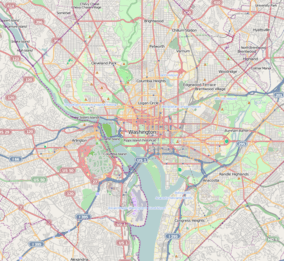Mount St. Sepulchre Franciscan Monastery
| Mount St. Sepulchre | |
|---|---|
|
| |
| Basic information | |
| Location |
1400 Quincy St. N.E. Washington, D.C., United States |
| Geographic coordinates | 38°56′15″N 76°59′07″W / 38.9375°N 76.9853°W |
| Affiliation | Roman Catholic |
| District | Archdiocese of Washington |
| Ecclesiastical or organizational status | Friary/Monastery |
| Website | www.myfranciscan.org |
| Architectural description | |
| Architect(s) | Aristide Leonori |
| Architectural type | Friary |
| Architectural style | Neo-Byzantine |
| Groundbreaking | 1898 |
| Completed | 1899 |
| U.S. National Register of Historic Places | |
| Added to NRHP |
17 January 1992 |
|
Franciscan Monastery and Memorial Church of the Holy Land | |
 | |
| Coordinates | 38°56′15″N 76°59′7.1″W / 38.93750°N 76.985306°WCoordinates: 38°56′15″N 76°59′7.1″W / 38.93750°N 76.985306°W |
| Area | 44 acres (18 ha) |
| NRHP Reference # | 91001943[1] |
The Mount St. Sepulchre Franciscan Monastery (Franciscan Monastery of the Holy Land in America) is located at 14th and Quincy Streets in the Brookland neighborhood of Northeast Washington, D.C. It includes gardens, replicas of various shrines throughout Israel, a replica of the catacombs in Rome, an archive, a library, as well as bones of Saint Benignus of Armagh, brought from the Roman Catacombs and originally in the Cathedral of Narni, Italy.
History
The Very Reverend Charles A. Vassani (1831–1896) established the U.S. Commissariat of the Holy Land in 1880, in New York City. It was from this location that Rev. Vassani and Father Godfrey Schilling, O.F.M. (1855-1936) began to plan to build a "Holy Land in America" and a Holy Sepulchre. They envisioned building on a high hill on Staten Island, overlooking the entrance to New York's harbor. These plans were later dropped. Eventually the plans changed to a wooded hilltop in Brookland, Washington, D.C.. In 1897, Fr. Godfrey purchased the McCeeney Estate in Brookland in order to found a monastery and church.
The six Brothers lived in the abandoned McCeeney house. After purchasing the site, Fr. Schilling visited the Holy Land and took measurements and photographs of the Holy Sites. In February 1898, ground was broken, and the cornerstone was laid on the Feast of St. Joseph.
Construction of the Holy Shrines, Gardens, and Rosary Portico continued for several years. The Church was consecrated in September 1924, on the twenty-fifth anniversary of its dedication.[2]
In January 1992, Mount St. Sepulchre was listed on the National Register of Historic Places.[3]
Architecture
The Church of the Holy Sepulchre was designed by the architect Aristide Leonori. The cornerstone was laid in 1898 and construction completed in 1899. The floor plan of the church loosely resembles the fivefold Jerusalem cross. It was built in the neo-Byzantine style, resembling Hagia Sophia in Constantinople.[4] Some Romanesque influences were added to the design.
The Rosary Portico designed by John Joseph Earley surrounds the church. It contains fifteen chapels depicting the mysteries of the Rosary. Each chapel contains plaques bearing the Hail Mary in nearly two hundred ancient and modern languages. The Rosary Portico resembles the Cloister of St. John Lateran in Rome and Saint Paul's Outside the Walls. Various Christian symbols from the Catacombs decorate the facade.
Attached to the Church is the neo-Romanesque Monastery. The Monastery grounds contain replicas of shrines in the Holy Land, a Lourdes grotto, and a replica of the Porziuncola.
Many artists and architects have contributed to the development of the site.[5]
Library & Archives
The Library and Archives contain various materials on the Holy Land and the early development of the monastery, monastery life and a large collection of vestments.
Gallery
-

Panoramic image of Mt. St. Sepulchre Franciscan Monastery
-

Stations of the Cross in the Monastery gardens.
-

Chapel of Saint Anne. A replica of the House of the Holy Family is located beneath the Chapel of St. Anne, but is not accessible to the public.
-

Ascension Chapel
-

Ascension Chapel
-

Ascension Chapel
-

Saint Jude shrine in the Monastery gardens.
-

Replica of the Tomb of the Blessed Virgin Mary
-

Gardens at the Monastery
-

Replica of the Lourdes Grotto
-

Interior of the Rosary Portico
-

Exterior of the Rosary Portico
References
- ↑ National Park Service (2010-07-09). "National Register Information System". National Register of Historic Places. National Park Service.
- ↑ "History". Franciscan Monastery of the Holy Land in America. Retrieved 7 Oct 2010.
- ↑ "National Register of Historic Places Registration Form" (PDF). National Park Service. Retrieved 7 Oct 2010.
- ↑ "It is built along the architectural lines of Hagia Sophia in Istanbul." Your Guide to the Franciscan Monastery, n.p., n.d., back page.
- ↑ "Architecture". Franciscan Monastery of the Holy Land in America. Retrieved 7 Oct 2010.
External links
| Wikimedia Commons has media related to Mount St. Sepulchre Franciscan Monastery. |